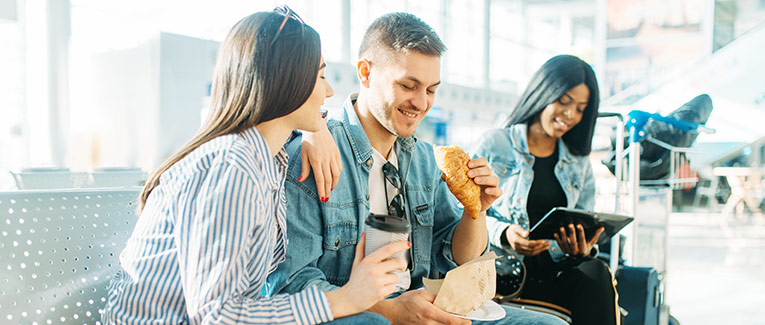
Going through the motions of booking a flight is no easy task, and let’s be honest, no one really gives any thought to what they eat that day.
From chugging down coffee to practically inhaling burgers, everyone at an airport has something on their minds other than their food.
This can cause various gastric anomalies in flight, which can lead to awkward moments between you, the cabin crew, and your fellow passengers.
What’s the Solution?
Avoiding consuming the items on this list, and help keep your digestive system in check while flying.
The items in this list are all safe, and sometimes even recommended for consumption regularly, but the human body was not designed to live at the altitude where airliners fly. The rules while up there are slightly different.
As a general rule, avoid these foods beginning about four hours prior to your flight, if not a day. The digestive system is shockingly thorough when it comes to its processes, and can take anywhere from two to eight hours to properly digest a meal.
Foods to Avoid Before a Flight (At All Costs)
1. Cauliflower
This is the one time that it is advisable to skip your vegetables.
Cauliflower contains loads of fiber, but it also packs quite a fair bit of a complex sugar that has been proven to cause bloating in certain people. When you combine this with the pressurized cabin of an airplane, it can be quite uncomfortable.
The cruciferous family of vegetables all pack the same basic ingredients, so it is best to extend the list of things to avoid to broccoli, cabbages, beans, Brussel sprouts, and kitchen sage.
In certain cases, cruciferous veggies are known to cause cramps as well, so these foods should be avoided pre and in-flight. Avoiding Fiber, in general, is advisable.
2. Coffee
Airplane cabins tend to have low humidity, which can dehydrate passengers measurably. Caffeine is a diuretic, which only expedites the process. Unsurprisingly, coffee is one of the most heavily caffeinated beverages most of us consume on a flight.
This applies to caffeinated tea as well. It will just end up sucking the moisture out of your body by way of innumerable trips to the bathroom.
Caffeine makes it difficult to enter REM sleep, and large doses of it make even normal sleep seem like a difficult task.
If you absolutely cannot avoid your coffee, make sure to drink enough water to keep yourself hydrated in-flight. If you’re wondering how much water to drink, doubling the amount of coffee that you drank is usually a safe bet.
3. Carbohydrates
Eating foods that are hard to digest, like complex carbohydrates, will increase gastric tensions, especially when the human body is subjected to pressure and temperature changes.
Although some people may remain unaffected by this, it is better to be safe than to be sorry.
Similarly, whatever you eat, reduce the portions a bit, because having a full stomach can make you uncomfortable during your flight.
4. Alcohol and Carbonated Beverages
While technically not a food, it is still best to avoid the liquor bottles while in-flight and pre-flight.
If you are scared of flying, you might be tempted to grab a drink and take a nap, but any sleep you do manage to snag will not be REM sleep. So, you could wake up feeling more tired than you were before nodding off.
The reason for this is the same as for caffeine. Alcohol dehydrates people even faster than coffee. Alcohol’s effects are also more pronounced and potent while up in the air, so even though your cocktail may gratify you momentarily, it may end up ruining your flight.
Imagine leaving a flight with jetlag and a massive hangover.
Carbonated beverages are also something to be avoided. They’re full of gas and bubbles, which does not mix well with a pressurized cabin at 30,000 feet.
Fruit juices and water provide palatable substitutes for your coffee, tea, water, and soda.
5. Spicy Foods and Chewing Gum
While you chew gum, you let a whole lot of excess air into your body.
This leads to big-time bloating and discomfort. Releasing your gas while tottering around back home is one thing, but it is just bad luck for whoever ends up being your seat partner in-flight.
Spicy food is known to irritate the intestines. This leads to gas and constipation in flight, which we are sure you would want to avoid.
Spicy food is also a known cause of short-term heartburn among people, and no one wants to have their throat on fire while they are stuck in an airplane.
6. Garlic and Onions
While these normally come loaded with health benefits, garlic and onions both cause very bad breath.
This becomes even more pronounced in places with air conditioning that recycles the cabin air. Even if you brush your teeth, garlic smells can resurface at a later point by traveling back up your esophagus when digestion is completed.
It is best to not include these in your meals before flights.
The temperature, pressure, humidity level, and overall atmospheric conditionsare very different when you are flying than they are on the ground. This can have some adverse effects on otherwise harmless, and even healthy, foods.
Now that you have been educated on which foods to avoid, you can focus more on the important things, like not missing your flight. As it can get delayed or cancelled, be sure to buy travel insurance before your trip begins. This way, you can have financial protection in place for your prepaid, nonrefundable bookings, plus a lot of other valuable benefits.

